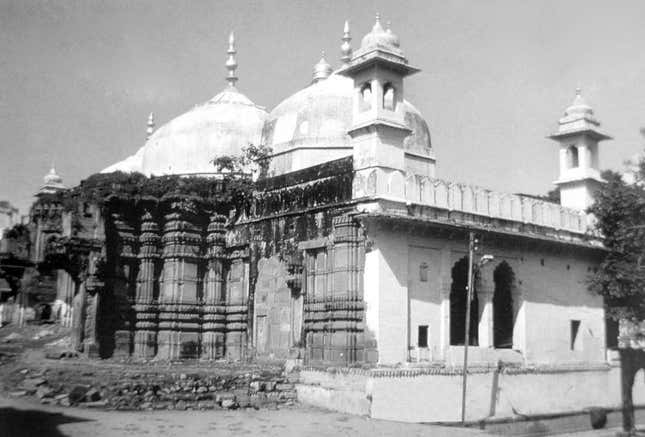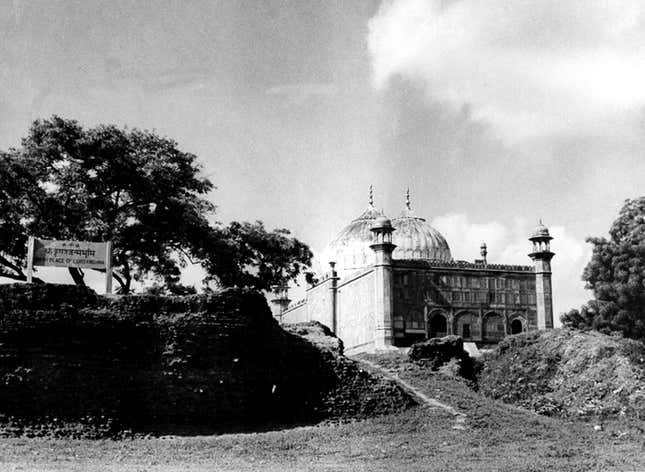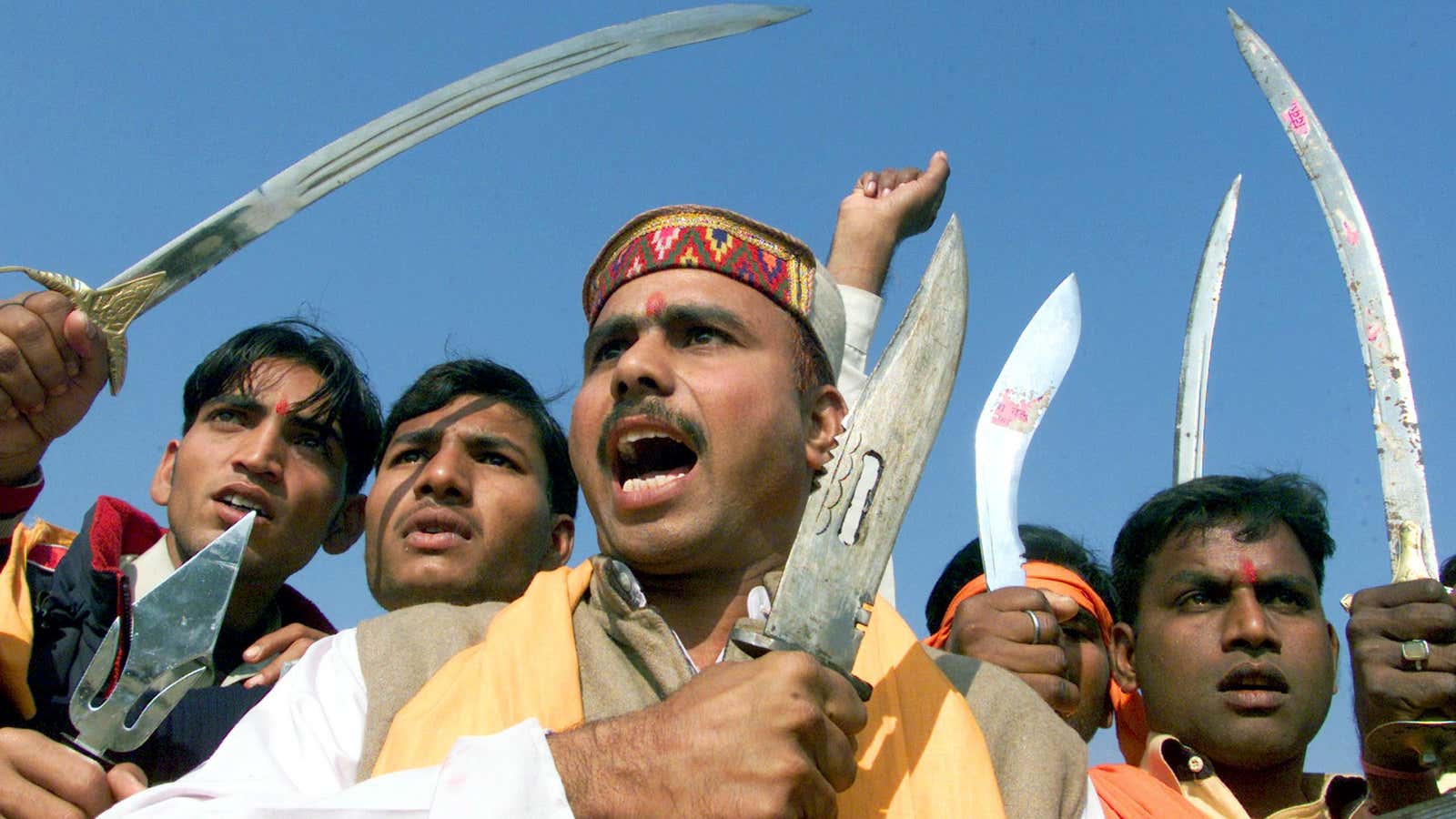It doesn’t end with Babri Masjid.
The violent history of the Ayodhya land title case has cast a shadow on the future of various mosques in the country contested by Hindu groups. Most of them are believed to have been built after the destruction of older temples, while a few are disputed as they are located in predominantly Hindu neighbourhoods.
An escalation of tensions at these sites is not rare, and often results in violence and a deepening distrust between the followers of India’s two biggest religions.
These mosques are protected under the Places of Worship (Special Provisions) Act, which states that a religious place will retain the same character it had on the day of India’s independence—Aug. 15, 1947. The law was enacted in 1991, at the height of the Ramjanmabhoomi protests, and did not extend to the contested Babri Masjid in Ayodhya that would be demolished the next year.
Legal sanctity, though, is not enough to protect religious structures in India, as the Babri Masjid’s demolition showed.
These are the other major disputed mosques in India:
Gyanvapi mosque
Varanasi, Uttar Pradesh

The Gyanvapi mosque shares a boundary wall with the Kashi Vishwanath temple in prime minister Narendra Modi’s parliamentary constituency of Varanasi in Uttar Pradesh.
During its centuries-old history, the Kashi Vishwanath temple has been demolished and rebuilt several times. The last being in 1669, when several historians believe the Mughal emperor Aurangzeb built the Gyanvapi mosque on the site. (Temple desecration was a common aspect of conquest in India even before the advent of Islam.)
The mosque walls still bear the marks of a temple. During the eighteenth century, Maharani Ahilyabai Holkar of the Maratha Malwa kingdom built the present-day Kashi Vishwanath temple beside the mosque.
Cut to 2018: Modi launched the Kashi Vishwanath corridor, a pet project that will cost the government Rs600 crore ($84 million) to build a pathway from the temple premises to the banks of the Ganga, which flows through the city and is held sacred in Hinduism. Most of the buildings surrounding the temple and the mosque have been demolished by official order, creating a fear among Muslims that the mosque is now vulnerable.
“Before the Babri masjid was demolished, the area around it was cleared. Everything around it was brought down till the mosque stood alone and exposed. And because the area was cleared, it meant that lakhs could gather. They did, and eventually demolished the (Babri) mosque,” Sayid Yasin, general secretary of the Gyanvapi mosque’s caretaker body told The Wire in March this year.
A part of the Gyanvapi mosque’s surrounding structure was destroyed last year during the project work. The district administration has since rebuilt it amid heated opposition from local Muslims.
Though the mosque is guarded by Indian paramilitary forces, tensions have risen lately. In March, a few local Hindus were reportedly caught trying to bury a small statue of Nandi (one of god Vishwanath’s chief attendants in Hindu mythology) near the mosque wall, in an apparently surreptitious attempt to prove that the remains of a temple lie buried underneath the mosque.
Shahi Idgah mosque
Mathura, Uttar Pradesh

The Shahi Idgah mosque stands adjacent to the Krishna Janmabhoomi temple complex in the city of Mathura, considered the birthplace of god Krishna in Hinduism. Historians believe that Aurangzeb also destroyed the ancient Keshavnath temple, and built the Shahi Idgah mosque on its plinth.
The Allahabad high court in 1935 had allotted the legal right over the land on which the mosque stands to the Hindu king of Varanasi. Ownership passed down to the Sri Krishnabhoomi Trust, which is dominated by Vishwa Hindu Parishad (VHP), an affiliate of the Rashtriya Swayamsevak Sangh, the ideological fountainhead of Modi’s Bharatiya Janata Party (BJP).
Under a 1968 agreement between the Shahi Idgah committee and the Sri Krishnabhoomi Trust, while the land remained with the trust, the management rights of the mosque itself was given to the Muslim committee.
However, Shahi Idgah remains one of the most hotly-contested mosques in India. A common mob slogan during the Babri Masjid’s demolition went: “Yeh to kewal jhanki hai, Kashi, Mathura baaki hai.” (This is just a sneak peek, Varanasi and Mathura are still left.) Since the Babri Masjid’s demolition, members of both the BJP and the VHP have on multiple occasions advocated the demolition of the Shahi Idgah mosque.
During this year’s supreme court hearing over the disputed land in Ayodhya, the Sunni Waqf Board, the main litigant from the Muslim side, reportedly made a confidential settlement offer to forego the claim to the Ayodhya site if the government promised to protect other mosques, most importantly the Shahi Idgah and the Gayanvapi mosque. But the Hindu parties in the case refused to negotiate, while other Muslim litigants also rejected the board’s offer.
Other mosques
Hindu groups also oppose many other religious Muslim sites in the country.
Kamal Maula mosque: The ruins of the Kamal Maula mosque in the central Indian state of Madhya Pradesh stand on the contested grounds of Bhojshala, an ancient Hindu shrine. The Archaeological Survey of India (ASI), which controls the ruins, allows Hindus to pray there every Tuesday morning and afternoon and on the festival of Basant Panchami, and Muslims are permitted to offer namaz there every Friday.
But the festival fell on a Friday in 2006, 2013, and 2016. The VHP and other religious groups demanded that Hindus be allotted the shrine for the whole day. However, escorted by police, Muslims managed to offer a token namaz on these high-tension days.
Quwwat ul-Islam mosque: Delhi’s first Friday mosque stands inside the compounds of the Qutb Minar, one of India’s main heritage sites. The monument was commissioned by Qutbuddin Aibek, who set up the medieval Delhi sultanate in India. An inscription at the site, attributed to Aibek, says that 27 Hindu and Jain temples were destroyed to build the mosque. Last year, the Hindu Mahasabha, a right-wing group, advocated that the entire complex be dedicated to the Hindu god Vishnu.
Nawab Ali mosque: Another historic mosque, the 300-year-old Masjid Nawab Ali in Delhi was lying unused till 2014, when regular prayers resumed at the site. But the surrounding area is now a shopping zone, with mostly Hindu store owners who say the mosque is bad for their business. Communal clashes broke out between Hindus and Muslims soon after regular prayers were resumed. Tensions haven’t fully subsided since.
